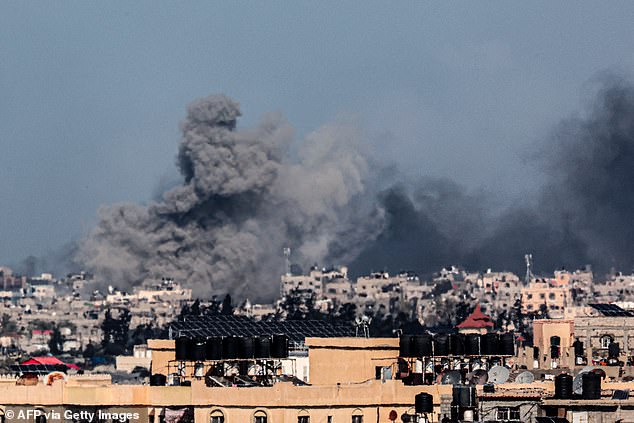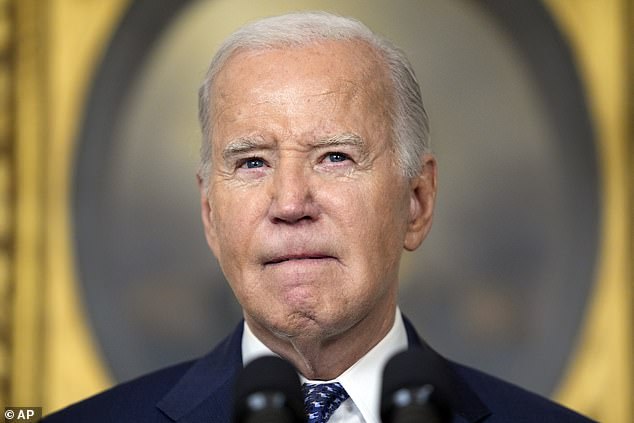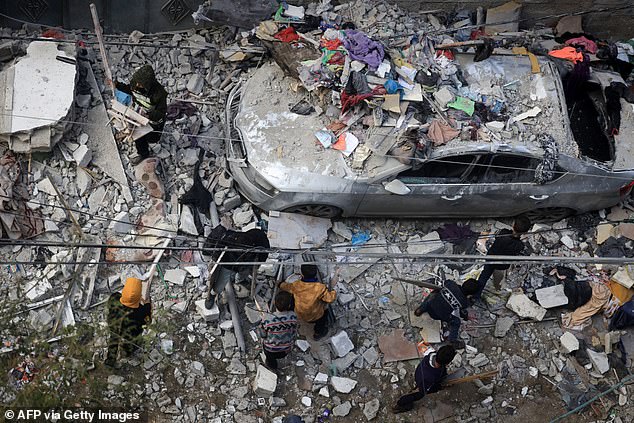Israel prepares to evacuate Rafah ahead of ground invasion to ‘defeat remaining Hamas battalions’ – hours after Biden condemned the IDF’s ‘over the top’ conduct
Israeli Prime Minister Benjamin Netanyahu has ordered the army to prepare a plan to evacuate the population of Rafah to defeat the remaining Hamas battalions.
It came hours after US President Joe Biden said he considers Israel’s behavior in the war to be “over the top.”
Netanyahu made the announcement today ahead of an expected Israeli invasion of the southern Gaza city and after international criticism of Israel’s plan to invade the busy city on the border with Egypt.
Israel says Rafah is the last remaining Hamas stronghold and it must send troops to complete its war plan against the Islamist terrorist group.
But an estimated 1.5 million Palestinians have gathered in the city after fleeing fighting elsewhere in Gaza.
Netanyahu said today that a “massive operation” is needed in Rafah.
Netanyahu made the announcement today after international criticism of Israel’s plan to invade the busy city on the Egyptian border.

A photo taken from Rafah shows clouds of smoke during the Israeli bombardment of Khan Yunis in the southern Gaza Strip on Friday
He said he had asked security officials to present a “dual plan” that would include the evacuation of civilians and a military operation to “collapse” Hamas’ remaining terrorist units.
Israeli airstrikes hit the central Gaza Strip and the southern city of Rafah on the border with Egypt overnight and into today, killing nearly 20 people, including women and children, witnesses and hospital officials said.
US Secretary of State Antony Blinken left Israel yesterday as the gap between the two close allies widens on the path forward.
More than half of Gaza’s 2.3 million residents have been displaced by Israel’s military offensive towards the border with Egypt. Unable to leave the small Palestinian territory, many live in makeshift tent camps or crowded shelters run by the UN.
The Palestinian death toll from the war has surpassed 27,840, the Gaza Health Ministry said. A quarter of Gazans are hungry.
The war began with Hamas’ attack on Israel on October 7, in which terrorists killed about 1,200 people, mostly civilians, and kidnapped about 250. Hamas is still holding more than 130 hostages, but about 30 of them are believed dead.
Israel’s stated intentions to expand its ground offensive against Rafah also sparked an unusual public response in Washington.
“We have not yet seen any evidence of serious plans for such an operation,” Vedant Patel, a State Department spokesman, said yesterday.
If we were to proceed with such an offensive now “without planning and little thought in an area that shelters a million people, it would be a disaster.”
National Security Council spokesman John Kirby said an Israeli ground offensive in Rafah “is not something we would support.”

Netanyahu’s announcement came hours after US President Joe Biden said he views Israel’s behavior in the war as “exaggerated.”

People assess the damage caused by the Israeli bombardment of Rafah in the southern Gaza Strip on Friday
The comments signaled an intensification of US friction with Netanyahu, who this week delivered a message of “total victory” in the war at a time when US Secretary of State Antony Blinken was in Israel to urge a ceasefire in exchange for the release. of dozens of hostages held by Hamas.
Aid officials also sounded warnings about the prospect of a Rafah offensive. “We need Gaza’s last remaining hospitals, shelters, markets and water systems to remain functional,” said Catherine Russell, head of the UN children’s agency UNICEF.
“Without them, hunger and disease will skyrocket, killing even more children’s lives.”
With the war in its fifth month, Israeli ground forces are still focused on the town of Khan Younis, just north of Rafah, but Netanyahu has repeatedly said Rafah will be next, causing panic among hundreds of thousands of displaced people.
Netanyahu’s words have also alarmed Egypt, which has said any ground operation in the Rafah area or mass displacement across the border would undermine the 40-year-old peace treaty with Israel.
The largely closed border between Gaza and Egypt is also the main entry point for humanitarian aid.
